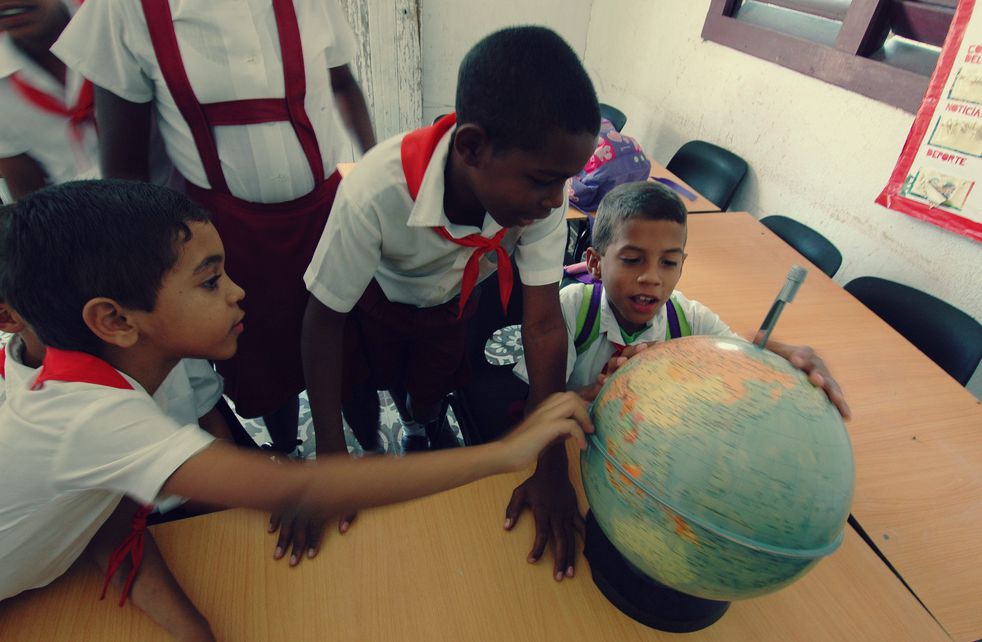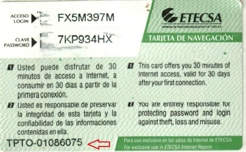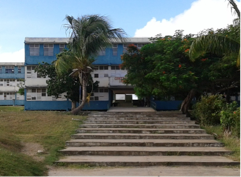A new Internet geography for Cuba
by Digital Rights LAC on December 19, 2016

Many Cubans yearn to discover the possibilities opened by the internet every chance they have to go online. Youths delve deep into the world of personal relationships, and use it mostly to meet new friends or to find relatives or old schoolmates who are no longer in Cuba, and have profiles in social media sites such as Facebook.
By Eliocer Cutiño*

Group of people waiting their turn in the ETECSA Telecenter in Macea Street, Nuevitas, Camagüey.
For them, they point out, it is a wondrous experience. Moreover, they remark that it is more comfortable than writing a regular letter and sending it via regular mail. Older folks often don’t see it as a tool that solves many problems, but they still see it as a necessity. This is why young and old alike find ways to make strong connections within the net of networks, without the slightest idea of how it would equally facilitate everyone’s social lives.
Quite recently I attended what is known as a Telepunto, part of the Cuban Telecommunications Company (ETECSA, for its acronym in Spanish), the only company in the island that offers internet service. I had been waiting for two hours to be able to use one of the working computers at the center and a lady who was waiting as well –and who seemed to be eager to talk in order to pass the time– told me that she found the internet useful to communicate with family and friends, but that otherwise she had no interest in it.
I said that I disagreed, that if she allowed me I could explain other reasons, and that I could base them on what she had done that day, if she agreed to tell me. She accepted the challenge and told me she had woken up early in the morning to go to the bank to collect her pension. That errand took her half the morning. Later she went to the bus terminal to try to find a ticket to go on a trip, but she gave up due to fatigue. From there, she decided to go to the ETECSA telecenter to send some pictures to her son, who lives abroad, which is impossible from her Nauta email.
I suggested that I could shorten her errands, based on my experience in other places where the internet is an everyday feature of people’s lives. “Madam, –I replied–, if you had this service in your home, you could have checked online whether your money was already transferred or deposited to your account, and to know, anytime, whether you have it at your disposal. Moreover, you could have bought your ticket online to travel, and to know which days were available.
Finally, you couldn’t just have sent photos to your son, but you could have talked and even seen your darling, who you may have not seen for years.” Her expression changed and the smile of someone who has discovered a new life said it all. She placed her hand on my head, like a grateful mother and told me: “You’re very kind, thank you. You’re right in everything you tell me.”
This brief but true anecdote warns us that there may be many things that we may still be unaware of, and that regardless of our age or our interests, any person, one way or another, may be the protagonist of a similar tale.
Some Guiding Principles for the Internet in Cuba
Recently I’ve had the opportunity to travel outside of Cuba to participate in some events about internet governance, a topic that is new to me and, though apparently simple, is full of unknowns for any person, regardless of nationality. From what I have learned in these activities, I’d like to highlight two topics that show the peculiarities of the context in which I live: access to the internet and privacy.
Since the year 1996, the Cuban Ministry of Information Technology and Communications, by means of Resolution 49 of 1996, established that telephony and information signal transmission were the exclusive concession of ETECSA, meaning that this state body controls all policy regarding access to receiving, searching, and sharing information, regardless of the medium.
According to the Inter-American standards, the right to access information must be guaranteed for all persons, and it cannot be restricted except for those cases provided by law to pursue legitimate ends such as national security or the protection of other rights, provided this measure is necessary and proportional. However, and although this issue isn’t precisely the point of this text, I think it’s relevant to mention that in Cuba, due to an old and outdated legal provision, Law Decree 99 of 1977, the State established, with some exceptions, that most information produced by either the state apparatus or in private and social contexts is a matter of national security.
After becoming familiar with this issue, and notwithstanding the fact that this is a controversial question in other parts of the world, I find it curious how in Cuba, all actions related to accessing the internet are registered. This is so common that it goes unnoticed by people, to whom it seems like simple bureaucracy that we still haven’t gotten over. This idea isn’t so naive, but it’s also the way in which, somehow, the right to information online is restricted, as is the technology that allows access to it. It is, de facto, a way to prevent the effective enjoyment of this right for people and communities, effectively resulting in discrimination due to place of residence, that is, to geographic fatalism.
I will try to describe briefly how we connect in Cuba. First, you have to get to one of those small and crowded offices called Telepunto, request a browsing card that costs one to two convertible pesos (1 to 2 dollars), for 30 minutes or one hour online, respectively. To get the card you must present your identity card, which is immediately registered by the government.

ETECSA internet access card
If you look closely, there is a bar code and a unique number in the bottom left corner of these cards, which is recorded in a digital registry enabled by ETECSA, in addition to the personal data from the person who purchased the coupon.
Completing the form is a requirement to be able to go online, after which one can browse easily, except for the low bandwidth of the service, the possibility that an unseen observer is following all of our searches, and the fact that some websites are restricted. In other words, it is as if we were fenced inside an impassable border, even if we feel immersed in an vast sea of information.
I’m talking of nothing other than privacy, a right that recognizes that nobody can be subject to arbitrary of abusive intrusion into their private and family life that causes harm to their life or reputation, or from excessive control over the use of technology, among others. States have the obligation not only to respect it, but to prevent others from unduly infringing upon this right. Insofar as Cuba continues to connect to the world of the internet, it will be of paramount importance for the government to commit to respect international and Inter-American regulations and standards that pertain this issue. It will also be imperative for the citizenry to become aware of the protection of this right.
Can There be a Different Vision of the Internet in the Cuban Context?
Cuba officially connected to the internet in the year 1996. Since then, the net of network is conceived as a public telecommunication service, centrally managed by ETECSA and exploited by state institutions expressly authorized by the Ministry of Information Technology and Communications.
Decree 209/1996 titled “Access from the Republic of Cuba to Information Technology Networks with Global Reach” sets out the policy that guarantees “full access to the Internet” in a regulated manner, first to legal persons and institutions most relevant for the life and development of the country. Recently, very slow attempts have been made to extend this service to private individuals, although it is still claimed that the technical conditions don’t yet permit this development. However, I believe there are many avenues that can be explored without the need for large investments.

Victoria de Girón School in the distribution 1 of Nuevitas, Camagüey
Experiences in other Latin American countries demonstrate that limitations in access to information sometimes are overcome by ingenuity rather than access to resources. For example, in Cuba there are some schools that are connected to the internet that, despite its low bandwidth connection, could be able to extend the signal using Wi-Fi antennas to the communities surrounding the school building. This has been already done in small countries in the region with great success.
Would a similar policy be possible in Cuba? Just in the province of Camagüey, where more than 120,000 students attend elementary and middle school, and there are more than 670 rural and urban schools throughout the region, implementing an initiative like this one would revolutionize access significantly.
It is also striking how the design of educational programs doesn’t contemplate, or even conceive of teaching topics related to the internet. However, in a nation that has fulfilled the United Nations Millennium Development Goals with respect to education, this pending subject openly contradicts the true interests of students who long for this service, and who have made it their own by sharing educational information systems using mobile and tablet apps with the sole purpose of connecting among themselves. This is a partial beginning of digital literacy.
This proposal is far from simple, but I wouldn’t discard the possibility that our vision would open a door to the world of the internet to Cuban. This vision isn’t at all contradictory with existing rules and regulations, but is an idea that would allow us to further develop our communities, which would play a vital role in the performance and the effectiveness of human rights.
The Private Sector in Cuba and the Internet

“Bahía de Nuevita”, a particular restaurant in La Colonia distribution in Nuevitas, Camagüey
This issue isn’t just suggestive of what I’m proposing in this writing, but also relevant to the endless possibilities that could be realized if the internet could reach small startups in Cuba, allowing these subtle alternative economies that are alive today on the island to grow and develop.
In the modern world, this means of connection won’t only allow us to communicate with faraway friends and relatives, we can also put it to work for our interests. The internet provides us the possibility of knowing information about any particular activity not just from Cuba, but also proposals from the entire world.
To better illustrate this idea, think of a person who works repairing PCs, DVDs, recorders, printers, etc. Faced with not being able to immediately fix the device, either because there is a lack of skills or necessary parts, a person can quickly order a part online or find how to solve the problem through videos and charts, and to do things he or she never thought possible.
If a person operates one of the so-called Paladares, places that sell typical foods, or a cafeteria, the internet is the perfect medium to make your business known in your country, and for foreign visitors to read about it ahead of time, and learn what it has to offer. These spaces can also provide internet connection, which will almost certainly increase sales and reservations, and provide better conditions for growing the business. It is an incomparable advertising medium, more efficient and responsive than traditional advertising.
This is one of the details we can focus on to understand this complex scenario. For Cubans this is also a novel medium that helps us break through some of the limitations we have today. Finding a way to connect and develop with just one click is very enticing for these times of dire need to open up economically to the world.
It wouldn’t be harebrained to think that what are now known as Non-Agricultural Cooperatives could request this service from the Ministry of Information Technology and Communications. Existing regulations allow legal persons to file such request, and, although the matter is surrounded by certain formalism, it is reasonable to try to shift toward providing services and selling goods online, beyond simply sharing information and advertising through this medium. If Internet access is expanded to legal persons such as Non-Agricultural Cooperatives, the circulation of information will not only be seen by Cuban citizens via the so-called “weekly packages”, but it would have a broader impact that can even transcend our Caribbean borders.
This is a call to see and recognize our own existing potential from a different perspective in order be able to develop and expand them. As our options grow, this will allow our capital to increase and to be more successful in our trade relations.
Are There Still Many People in Cuba Who Haven’t Connected to the Internet?

Computer available in the ETECSA telecenter in Nuevitas, Camagüey
There is still much to do regarding the Internet… It is true that actions have been undertaken to reduce the digital gap, but we should think of this as a right, and it is our right to have timely access to this technology. This is why I’d like to share two aspects: one referring to people still lacking access, and the second to the obligation of the State.
Access to the internet means access to receiving, searching and sharing information and ideas without restrictions of any kind. It is, moreover, conceived as a human right, as part of the right to freedom of thought and expression, embodied and supported by the Cuban Constitution in articles 54 and 55.
To cite an example of how many people still lack internet connection, in statistical terms, I shall use as a reference Nuevitas (Camagüey, Cuba), an industrial city with a significant population, and where internet access remains an embarrassment. This town, or villa, as it was formerly known, has more than 61,625 inhabitants according to the last population census. There is one ETECSA telecenter, with four computers connected to a company server where, as I mentioned, one must sign in with a personal ID number in order to have access to the service.
A quick mathematical calculation makes it clear that there is one PC with access for every 15,406.25 inhabitants, representing only 0.0065% PCs per person. Added to the lack of computers, think about the bureaucratic paperwork required to connect, long lines to simply purchase the coupon, and also to use a computer. There is no doubt that, to reduce the existing digital gaps, these calculations give us an idea of how much there is yet to do.
Regarding the State, it has the obligation to remove the obstacles that keep the citizenry, or a given sector, from sharing their opinions and information. In the digital realm, this means adopting measures aimed at guaranteeing this service for all people, especially to vulnerable groups. It also means having access under equal conditions, without discriminatory treatment.
In principle, it is the Cuban State, in this case, who must guarantee the free enjoyment of these rights, as established by Article 9 of our Constitution, since all communication media are the property of the State. Besides, it is essential that a plurality of opinions is guaranteed, as well as maximizing openness in the public sphere.
Finally, I conclude with the idea that access to the internet must be universal in nature and also inclusive. For this, it is necessary to strengthen training and education in all sectors. We shouldn’t be content with an internet that lacks global features. This must be our objective if we wish to guarantee effective internet access in the future that I aspire to for Cuba.
*Eliocer Cutiño is an independent attorney and a member of the Camagüey delegation at the Centro de Información Legal Cubalex.





